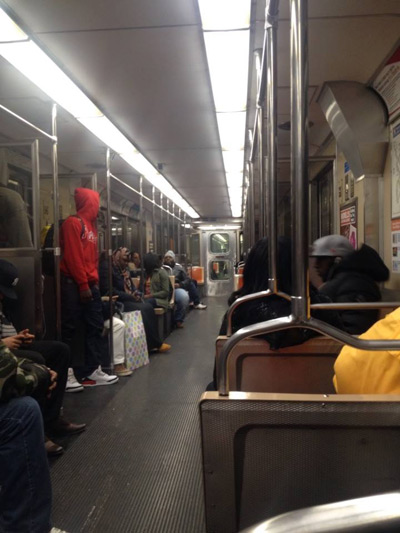Black Men: The Receptacle Into Which You Toss Your Fears

A train full of thugs? I don’t think so. Photo | Sandy Smith
If you’re reading this, and you are white, and you have friends who happen to be black men — none of these safe assumptions — you might want to ask them whether they’ve ever had experiences like the one I’m about to share with you. Chances are, they have:
One day a few years back, I was waiting for an elevator with a friend in the Washington Square West apartment building where I then lived. I was dressed in the casual uniform men of all ages and races in America have adopted: blue jeans and a T-shirt.
The elevator doors opened to reveal a young white woman on board. My friend and I walked in, and the woman immediately shrank as far back into the opposite corner of the car as she could, with an anxious look on her face.
As we exited to the lobby, I turned and said to my friend, who is also black, “And there you go. I just had one of those moments when I was reminded who I really am.”
And that, dear readers, is a threat to your very safety and security.
My friends, I’m sure, will be surprised to find this out. But that’s what that woman in the elevator told me, and it’s what many other whites tell black men they’ve never met every day.
One of those raised his — or is it her? — voice in response to my post last week about ways to get more Philadelphians to use our great mass transit services. Nothing SEPTA could do would get this person onto a bus or train, it seems, because they’re all full of these black folks just gunning to roll him (or her):
To hear this person tell it, black-on-white crime is an epidemic, and black criminals have whites in their crosshairs. (The language of the comment may have been a little less direct, but one could pick up the same message from that infamous March cover story in this magazine.)
Never mind that just about every statistic you can find on race and crime tells us that in the overwhelming majority of violent crimes, the victim and perpetrator are of the same race, and that white-on-black violent crime is as common as black-on-white. (Keep that in mind when you read the next story about the Knockout Game.)
(According to 2008 Bureau of Justice Statistics data [see below], the most recent available, about the only exception to this pattern is robbery, where whites are more likely to be relieved of their property by a black robber than the other way around. But that statistic says more about property, and who has it, than about race. I probably would make a very appealing target in my relatively high-crime neighborhood, given the stuff I carry around with me as I do my work. So far, I haven’t been bothered at all. Maybe it’s because at some subliminal level, I know what to look for and white folks don’t?)
What I must sadly conclude is that, no matter how successful, how intelligent, how middle-class or how integrated we may be, to some — too many — white people, we will always be Them.
It seems that every society in human history has had a need to divide humanity into Us and Them, mainly with the purpose of making Us feel good about Ourselves and maybe assuaging Our guilt about Our own faults and shortcomings. Those we offload onto Them, who become the embodiment of all that’s wrong with Our society — largely ills of Our own making.
If you are white, and you still wonder why blacks, especially black men, get so touchy about how we are represented in popular culture, how we are portrayed in the media, you might want to ponder this for a while. Upper-class whites may look down their noses at “poor white trash,” but not all whites therefore become suspect.
We black men don’t enjoy that privilege.
Follow @MarketStEl on Twitter.


